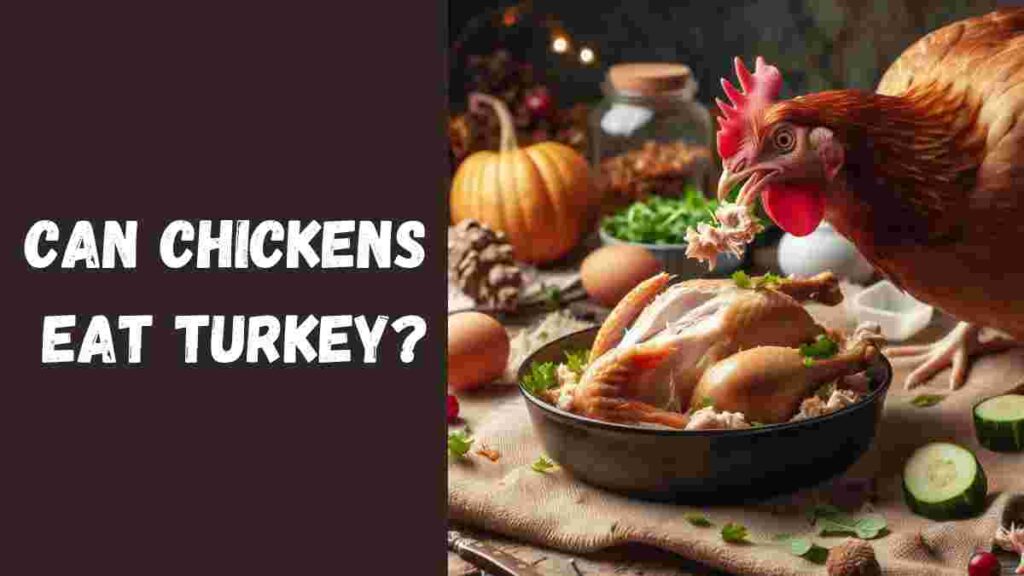Can chickens eat turkey? The world of poultry care is as intricate as it is fascinating. Understanding the dietary needs and habits of our feathered friends is paramount to their well-being and the efficacy of your poultry-related activities.
With that in mind, this comprehensive guide is tailored to poultry owners, animal nutrition enthusiasts, and sustainable living followers who are questioning the compatibility of turkey in their chickens’ diets.
We’ll explore the intricate details of incorporating turkey into your chicken’s menu, from the nuances of nutritional requirements to the preparation and safe practices. We will try to answer the question, “can chickens eat turkey?”

Table of Contents
Understanding Chickens’ Dietary Needs
The Natural Diet of Chickens in the Wild
Domesticated chickens, though distant relatives of wildfowl, have been selectively bred over centuries. The modern chicken’s wild ancestors were opportunistic omnivores, foraging for seeds, insects, and the occasional small mammal. This varied diet was essential to their survival and remains a basis for understanding their dietary needs today.
Nutritional Requirements for Domesticated Chickens
Domesticated chickens have distinct nutritional requirements to support their growth, energy, and egg production. Here’s a brief rundown of what constitutes a balanced chicken diet.
1. Protein Needs
Protein is vital for muscle development, immune function, and egg production. Depending on the chicken’s life stage, protein should make up a significant portion of their diet. Chicks require the most, while laying hens and roosters need a balanced amount for their respective functions.
2. Carbohydrates and Fats
Carbs and fats are the primary energy sources for chickens. They assist in maintaining optimum body temperature and sustaining energy levels for day-to-day activities.
3. Vitamins and Minerals
Amino acids, in particular, are crucial for feather growth and repair. Other vitamins and minerals like calcium, phosphorus, and Vitamin D are essential for bone strength and eggshell quality.
Protein-Rich Food For Chickens

Introducing Turkey as a Food Option for Chickens
Can chickens eat turkey?
The answer to the question “can chickens eat turkey?” is yes. Chickens can indeed eat turkey, making for an intriguing option to diversify their diets. However, there are several factors to consider before adding this protein-rich bird to your poultry’s palette.
Factors Influencing the Suitability of Turkey for Chickens
When assessing whether turkey should be a regular part of your chickens’ meals, it’s important to compare the nutritional makeup of turkey to the chicken’s native diet and dietary requirements.
Nutritional Composition Comparison
Turkey meat is high in protein and other nutrients, making it an excellent potential supplement for chickens. Examining the specifics of macronutrients and micronutrients will determine its suitability for an individual or flock.
Digestibility Considerations
The digestive systems of chickens differ from those of humans in their efficiency at breaking down certain foods. Turkey that is processed or prepared in a way that aligns with the chicken’s digestive capacity is essential for safe consumption.
Benefits of Feeding Turkey to Chickens
Enhanced Protein Intake
For chickens, particularly those that are molting, growing feathers, or laying eggs, a protein boost can be very beneficial. Turkey provides this and can support their various life stages and activities.
Potential Cost-Effectiveness
Depending on local turkey prices, feeding leftover or less desirable turkey parts to your chickens can be a cost-effective way to boost their diet and keep waste to a minimum, contributing to a sustainable farming practice.
Variety in Diet and Enrichment
A varied diet is not only more enjoyable for chickens but also more nutritionally beneficial. Including meats like turkey can be a source of environmental enrichment as it mimics natural foraging behavior.

Risks and Considerations
Possible Health Implications of Feeding Turkey to Chickens
High-protein diets, if not balanced, can lead to health issues such as obesity, liver strain, or kidney problems. It’s crucial to ensure that turkey is part of an overall balanced diet.
Moderation and Balance in Poultry Diets
Again, moderation is key. Chickens should not subsist on turkey alone, and its introduction should not drastically change the overall composition of their feed unless planned carefully.
Allergic Reactions and Sensitivities
Just like humans, chickens can exhibit allergies or sensitivities to certain foods. Monitor your flock closely upon introduction to turkey, looking for signs of an adverse reaction.
Guidelines for Introducing Turkey to Chickens’ Diet
Gradual Introduction Methods –” Can chickens eat turkey? “
Start by feeding small amounts of turkey to gauge your chickens’ response. A gradual increase in serving size over time, combined with observation, will allow you to adjust their diets safely and effectively.
Monitoring Chicken Behavior and Health
Observe any changes in behavior, stool consistency, appetite, or feather condition. Regular health checks are an essential part of responsible poultry care.
Adjusting Portion Sizes and Frequency of Turkey Feeding
Depending on life stage and activity level, chickens will require varying amounts of supplementary food. With turkey, start small, and adjust portion sizes accordingly.
Alternative Protein Sources for Chickens
Exploring Other Protein-Rich Foods
For those who prefer not to feed poultry byproducts to their chickens, alternatives like fish, dairy, and beans can offer protein-rich paths for a balanced chicken diet.
Plant-Based Options for Protein Supplementation
Soy, alfalfa, and other legumes can provide a plant-based protein source for chickens. These options can contribute to a balanced diet and are often more sustainable and economically viable.
Incorporating Insects and Grubs Into the Diet
Insects are a natural part of a chicken’s diet and a high-quality protein source. They can be a mainstay or supplement to a chicken’s diet, depending on your goals and resources.
Common Misconceptions About Feeding Chickens
Myth-Busting: Addressing Common Misconceptions About Poultry Nutrition
Misinformation about chicken diet abounds. It’s important to separate fact from fiction when making decisions about what to feed your flock.
Debunking Myths Surrounding Turkey Consumption for Chickens
Many myths surround the feeding of turkey to chickens. We’ll explore and clarify the most common misconceptions to ensure accurate knowledge on the subject.
Clarifying Dietary Guidelines for Optimal Poultry Health
To optimize your chickens’ health, stay informed about their nutritional needs and any potential contributions to their diet.
Practical Tips for Chicken Owners
Sourcing Quality Turkey for Chicken Consumption
Where and how you source turkey for feeding to chickens makes a significant difference. Always aim for fresh, high-quality, pesticide-free, or organic sources.
Preparation and Serving Methods
Proper preparation, including cooking and safe handling, ensures that the turkey remains a healthy part of your chicken’s diet.
Storage and Safety Considerations
Food safety is universally important. Guidelines and best practices should be followed when storing, preparing, and serving turkey to chickens. The answer to the question “can chickens eat turkey?” is yes.
You May Also Like
Frequently Asked Questions (FAQs)
Can Chickens Eat Cooked Turkey Leftovers?
Yes, cooked turkey leftovers can be a safe part of a chicken diet if they are properly prepared and served.
Will Feeding Turkey to Chickens Affect Egg Production?
Feeding turkey as part of a balanced diet should have no negative effect on egg production and may, in fact, improve overall flock health.
Are There Any Risks of Feeding Raw Turkey to Chickens?
Feeding raw turkey to chickens carries an increased risk of bacterial contamination. It is generally safer to feed cooked turkey.
How Much Turkey Can Chickens Safely Consume?
Portion size should be based on the needs of the individual chicken or flock. Start with smaller portions and adjust as needed.
Can Feeding Turkey to Chickens Change the Taste of Their Eggs?
Anecdotally, some say that foods chickens feed on can impact egg flavor, but in general, varied diet results in healthier, more robust flavors in eggs.
Conclusion
In summation, as the domestic chicken’s caretaker, you have the exciting opportunity to provide a nutritious and varied diet that encompasses the complexities of its dietary history. The answer to the question “can chickens eat turkey?” is yes.
By responsibly introducing and monitoring the consumption of turkey, you add depth to their nutritional experience and potentially improve their overall health.
Always remember to consult with a poultry nutritionist or veterinarian for specific dietary concerns and perspectives, and to take the time to immerse yourself in the fascinating world of poultry care. Happy farming!
